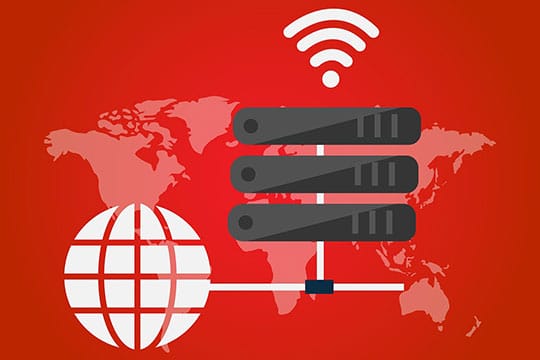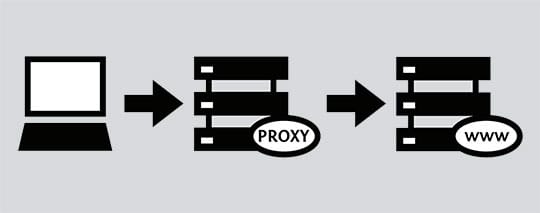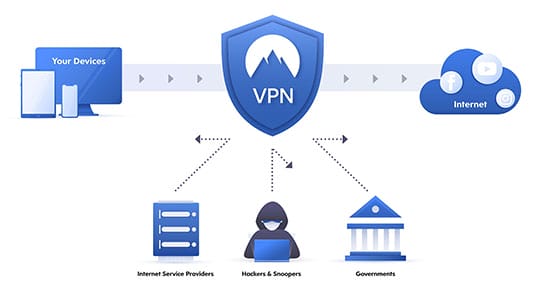We could go without Proxy, just as we could also go without a VPN – and no apocalypse would start. However, every detail about us risks being exposed. Without them, all of our details would be left at the mercy of hackers – some of them just itching to hack into some very juicy details. If you have important information on your computer, then you already know how crucial it is to keep it all safe.
When it comes to protecting the privacy of the server, most people go for either proxy or VPN. Many people confuse between the two and use them interchangeably. Still, while they do have similarities, they are actually very different.
What is VPN and Proxy Server?

Whenever you are trying to access a website, a connection will be formed between your computer and the website that you are visiting. Whenever you are visiting, your IP address (which is essentially the home address of your computer) will remain recorded for those using that website to see. This way, they can exchange information right back to you, using your information.
Now, that would not be a very bad idea. Think of it as an actual home address. If only the mailman knows it, then it would be all good. However, if someone that means you harm learns about it, then it might not turn out so well for you.
A VPN and a proxy will work by rerouting your connection through another server – another “dummy IP,” so to speak – before it reaches the website. Said website will not be able to see the original IP – instead, it will see the proxy’s IP, hiding yours. The VPN works pretty much in the same way, but with different methods, and with a few extra privacy kicks.
The proxy server is a good way to keep an eye on what websites your users are accessing, keeping everything else hidden, whereas the VPN will set up a secure route instead – to provide a better connection. In a way, you could say that the VPN provides better security when compared to the proxy.
Recommended for you: VPN vs RDS vs VDI: What to Choose for a Secure Remote Access?
Learning about the Proxy Server

As mentioned, the proxy server (wiki) will act pretty much as a buffer between your computer and the website that you are trying to access. In other words, it puts your own IP under a cloak of invisibility – and instead of seeing your IP, the website or computer that you are trying to connect to will only be able to see the “dummy IP” provided by the proxy. It is also why they are called “proxy” – meaning “replacement.”
There are three types of proxy servers that you may go for, as they branch out in the following:
HTTP Proxy
 The HTTP proxy server will generally only cater to web pages. If you buy an HTTP proxy for your browser, all of the traffic that you go through using that browser will be rerouted so that it passes through that proxy. It is a very useful choice when it comes to browsing the Internet and trying to access websites that are geographically restricted.
The HTTP proxy server will generally only cater to web pages. If you buy an HTTP proxy for your browser, all of the traffic that you go through using that browser will be rerouted so that it passes through that proxy. It is a very useful choice when it comes to browsing the Internet and trying to access websites that are geographically restricted.
SOCKS Proxy
 The SOCKS proxy isn’t just limited to web traffic such as the HTTP proxy. At the same time, it will only work up to the application level. For instance, you may set this proxy up on a P2P platform, a video streaming app, or your average server game.
The SOCKS proxy isn’t just limited to web traffic such as the HTTP proxy. At the same time, it will only work up to the application level. For instance, you may set this proxy up on a P2P platform, a video streaming app, or your average server game.
Even though these proxies have the ability to handle all types of traffic, they tend to be slower compared to the HTTP proxy. This is not necessarily because the quality is poor – it happens because this proxy is much more popular. Because of this, it will require a much bigger load.
Transparent Proxy
 This is a slightly different type of proxy; mainly because those who use it are not even aware of its existence. Unless they check in particular or install it themselves, the chances are that they don’t know they are using it.
This is a slightly different type of proxy; mainly because those who use it are not even aware of its existence. Unless they check in particular or install it themselves, the chances are that they don’t know they are using it.
“Most of the time, parents or employers are the ones who set it up in an attempt to monitor the user’s (child or employee) activity or to restrict his/her access to certain pages. Cafes and hotels might also use this proxy to authenticate the users on a public Wi-Fi – and homes or companies might also make use of it to save some bandwidth.” – as mentioned by proxy-store.com at one of their recent articles.
You may buy proxy from a variety of sources, the choice here is entirely up to you.
Going for VPN

A proxy is a great option for rerouting your computer’s traffic and passing it through a replacement server. But if you want to get a bit more privacy, then you might want to go for a Virtual Privacy Network – or VPN (wiki), as it’s commonly known.
Just like with the proxy, the VPN will reroute your traffic through a different server, hiding your original IP this way. It functions on an operating system level. So, this means that unlike the proxy, this one will direct all of your traffic – no matter if it is coming from a background app or a browser.
“The VPN will also encrypt the traffic happening between your device and the Internet. This means that your ISP (Internet Service Provider) will no longer be able to monitor your activity on the web. All they will be able to see is the fact that you have been connected to a VPN.” – as mentioned by NordVPN at one of their recent articles.
Moreover, this encryption from a VPN will protect you from the surveillance of the government, website trackers – as well as anyone who might be snooping around in hopes of hacking your computer. In the end, the VPN should be able to offer you the privacy and security that you need.
You may like: VPN (Virtual Private Network): 5 Things it Does & 5 Things it Doesn’t Do.
Differences between Proxy Services and VPN

As you may have already realized, while VPN and proxy both have their own similarities – to the point that they are often confused with one another – there are also some very noticeable differences between the two. Here you have a very quick comparison between them.
1. Traffic Encryption
 A VPN will encrypt your traffic, protecting your privacy – whereas the proxy will not do that. A VPN will keep you protected from ISP tracking – but also from hackers and government surveillance.
A VPN will encrypt your traffic, protecting your privacy – whereas the proxy will not do that. A VPN will keep you protected from ISP tracking – but also from hackers and government surveillance.
Proxies will generally not do that. This is why they should not be used if you have more sensitive operations to handle. They should only be used for trivial tasks, in which you do not particularly care whether your activity is tracked or not.
However, make sure that you get a VPN that doesn’t store your communication log or data. This will keep you safe from any demands from the government, preventing your logs from being exposed.
2. Operation Level
 A VPN will work on any operating system level, rerouting all of the Internet traffic. Whereas the proxy will be working on an application level. This means that while the VPN will be rerouting all of your traffic, the proxy will only be rerouting the traffic coming from a specific browser or app.
A VPN will work on any operating system level, rerouting all of the Internet traffic. Whereas the proxy will be working on an application level. This means that while the VPN will be rerouting all of your traffic, the proxy will only be rerouting the traffic coming from a specific browser or app.
3. Browsing Speed
 Since VPNs tend to be more complicated as they are encrypting your data, they are also much slower when compared to a proxy. Still, for many people, this is by no means a deal-breaker; there are various other methods for you to increase your browsing speed and connection.
Since VPNs tend to be more complicated as they are encrypting your data, they are also much slower when compared to a proxy. Still, for many people, this is by no means a deal-breaker; there are various other methods for you to increase your browsing speed and connection.
This is actually quite a crucial step to take if you need the browsing speed to be fast (e.g. in the medical field, where everything needs to be delivered at an exact point). In operation rooms, for example, during joint operations with open communication, it is crucial that the connection stays true to the last mini-second.
4. Payment
 VPNs tend to be more expensive, due to the fact that they generally offer better security. Usually, they are paid, and you can rarely find a VPN that is not. A proxy, on the other hand, is less expensive. In most cases, you may also find them free of charge.
VPNs tend to be more expensive, due to the fact that they generally offer better security. Usually, they are paid, and you can rarely find a VPN that is not. A proxy, on the other hand, is less expensive. In most cases, you may also find them free of charge.
Between free services and paid ones, you may want to always choose the paid ones. Not only do free services have certain limitations, but some of them may also mine your data. So, as you might guess, they may not be a very good choice if you are handling sensitive data.
5. Reliability
 A VPN connection is very reliable, whereas a proxy server tends to drop quite frequently. While this might not be a problem if you are handling trivial day-to-day data, this might actually be quite a problem if you need that connection to be nice and secure. In conference rooms or operation rooms, for example, you do not want the connection to drop every five minutes. So, a VPN is a better choice in such cases.
A VPN connection is very reliable, whereas a proxy server tends to drop quite frequently. While this might not be a problem if you are handling trivial day-to-day data, this might actually be quite a problem if you need that connection to be nice and secure. In conference rooms or operation rooms, for example, you do not want the connection to drop every five minutes. So, a VPN is a better choice in such cases.
You may also like: 5 Essential Reasons to Use Anonymous Proxy Servers.
VPN vs Proxy: Which One is the Better Option?

In their purpose, they are quite similar. However, in terms of reliability, the VPN is certainly the better option. It has the ability to encrypt traffic from all browsers; whereas the proxy can only control one specific browser or app.
If you care about your security and privacy for handling sensitive data, you might want to go for a VPN. This is more difficult to hack into. Otherwise, you should just use a proxy, as it can also hide your IP and protect your privacy.






